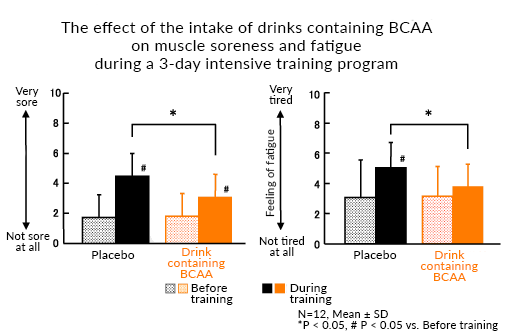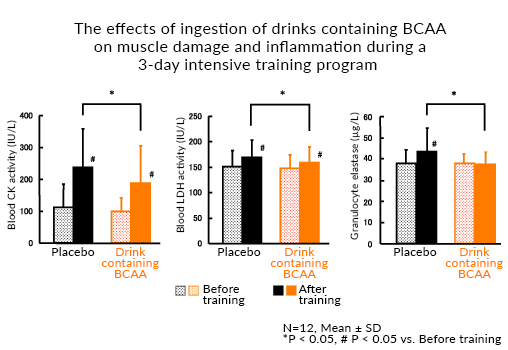Branched-chain amino acid supplementation attenuates muscle soreness, muscle damage and inflammation during an intensive training program
Matsumoto K, Koba T, Hamada K, Sakurai M, Higuchi T, Miyata H
J. Sports. Med. Phys. Fitness 2009; 49: 424-431
Objective
To assess the effects of branched-chain amino acid (BCAA) supplementation on muscle soreness, muscle damage and inflammation during an intensive training program.
Methodology
12 long-distance track and field athletes (male and female) were given either a drink containing BCAA (4g/500mL) or an isocaloric placebo drink, and a double-blind crossover study performed. A three-day high-intensity training program was conducted twice, with a three-week interval between the programs. Every day during the training period, subjects ingested 2,500mL of either the BCAA drink or the placebo drink, and overall muscle soreness and fatigue were determined using the VAS method*. Blood samples were taken before the training and after the three-day trainings, and blood creatine kinase (CK) and lactate dehydrogenase (LDH), indicators of muscle damage, as well as plasma granulocyte elastase, an indicator of inflammation, were measured.
- *VAS Method: An abbreviation for the "Visual Analog Scale" method. A 10cm horizontal line connects opposing points on either end of the line, and respondents mark a single vertical line corresponding to their mood (feelings) at the time, thus providing a way of quantifying subjective feelings by measuring the distance of the vertical line from the left edge.
Results
Compared to pre-training levels, increased muscle soreness was observed post training both when taking the placebo drink and when taking the BCAA drink. However, the onset of soreness was inhibited significantly more when taking the drink containing BCAA compared to the placebo. Fatigue was also inhibited significantly more when taking the BCAA drink relative to the placebo. Blood CK and LDH activity were significantly suppressed when taking the BCAA drink compared to when taking the placebo drink. Post-training plasma granulocyte elastase was significantly high only when taking the placebo drink. Significantly lower plasma granulocyte elastase was found when taking the BCAA drink relative to the placebo.
Conclusions
Intake of drinks containing BCAA alleviates muscle soreness and fatigue during high-intensity training programs while simultaneously diminishing muscle damage and inflammation. The results suggest that drinks containing BCAA may be effective in regulating the physical condition of athletes during successive bouts of high-intensity exercise, such as at training camps.











